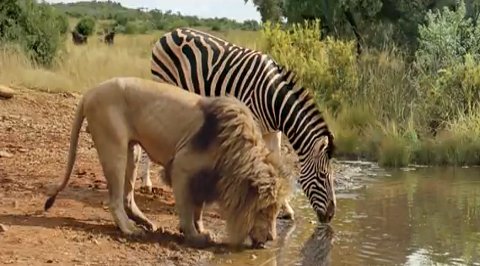"Man is a rope, tied between beast and overman--a rope over an abyss. A dangerous across, a dangerous on-the-way, a dangerous looking-back, a dangerous shuddering and stopping. What is great in man is that he is a bridge and not an end: what can be loved in man is that he is an overture and a going under. I love those who do not know how to live […] for they are those who cross over." -Friedrich Nietzsche, Thus Spoke Zarathustra (Strauss’ magnum opus on Nietzsche’s seminal work might make good listening for this discussion)
It's Philosophy Friday™ (Filosofy Friday? Philosophy Phriday?)! Let’s start off by answering an ostensibly simple question: Is mankind an end in of itself, or just an interim between animal and something greater? There are a few dimensions to the question, so I’m going to strip it apart and ask particular questions. Also I’m going to interject what some philosophers, scientists, artists, etc might think, and you can agree or disagree with those perspectives.
Is man/mankind an end in of itself… I believe an individual person can choose for themselves the reasons they live for and what virtues to live by. That said, there are common virtues that nearly all cultures share; so if there are good qualities to pursue (which is up to debate), and those qualities are universal (ie they apply to all individuals), then there is a greater end to which the whole species should be collectively moving towards (which is everybody embodying those virtues). What are these “universal” values? Can we name them all? Who decided on them; in fact, did anyone decide on them at all or are they natural (ie evolved into our species)?
Aristotle argued that there are virtues that exist as ideals, and that a good man strives to see such virtues embodied in himself. The greeks had the concept of eudaimonia, which (among many other things) was the happiness one experienced by approaching moral ideals through ethical actions; is a man’s “end” the achievement of virtuous ideals in his lifetime? Friedrich Nietzsche argued (quite infamously) that there is an “overman” or Übermensch, a man who can decide all moral virtues for himself and is not beholden to superstitions to know what to do with his life. Do you believe in the Übermensch? Can we all be the “overman”, or is it only possible for select individuals with the prerequisite intelligence, passion, etc? Søren Kierkegaard’s work (specifically on subjectivism) is the cornerstone of existentialist thinking and I recommend looking into it if you want another perspective (unfortunately I’ve already written too much).
Is man an interim between animal and something greater… We should all be familiar with Darwin’s theory of evolution, though I think many people have misconceptions about what it actually says (especially concerning the topic at hand); there is no thing that is “more evolved” than another thing in its era, and evolution does not have an “end” to which it is striving. Life’s only purpose is life itself. It seems according to Darwinist thinking, there is no greater “end” to which man is approaching; yet Darwinism has been used (or misused, to be accurate) to justify eugenics at the beginning of the early 20th century, whose ideological goal was to improve the human race. As we experienced first-hand in last week’s discussion on what seperates man from animal, there is some aspect of humans that makes us unlike any other lifeform on Earth; does mankind have an “end” that transcends the process of evolution? Transhumanism is a movement to improve the human condition through technology (paraphrasing from Wikipedia) and seeks to “elevate” mankind to a greater end beyond what nature/evolution has provided for us so far. They believe in unlocking the posthuman; is it the purpose of technology to end mankind and foster a new, greater kind of human? Christians believe that life is just a preliminary to eternal paradise (or eternal punishment) after death; so to them, is the “end” of man to join together with God in heaven?
I ask you to consider what you personally feel about the idea that human beings have an “end” (ie something greater) to strive for? Is this a good thing or a bad thing? Some would argue that kind of thinking leads to eugenics and death camps, while others argue that kind of thinking is second nature to us considering we’re told constantly by others to exercise, learn, live ethically, work hard, etc.
And finally, do you think you better yourself everyday, and if so, then how? I like to think I do, as I try every week to read (learning new ideas), hike (appreciating nature), run (improving my health), socialize (fostering relationships), watch a movie (appreciating art), etc; am I actually bettering myself, or is all the stuff I do basically masturbation (ie does nothing to actually achieve any greater end)? Even if those things do improve me as an individual, am I doing my part to help mankind? Should I also be giving to charity, teaching children, growing food for others, etc? And by improving myself, am I improving mankind on its journey to something greater? You can ask yourself these questions or use me and my habits as an example.
I have a metric shit ton of more questions to consider, like the way “genius” plays in man’s greatness, but there’s already too much on the table so I’ll save them for later. Also, I’m going to be pretty busy today but I’ll keep track of the discussion from my phone (and try to interject when I can), but I’ll be back in full force when I can sit down with my laptop later tonight.

